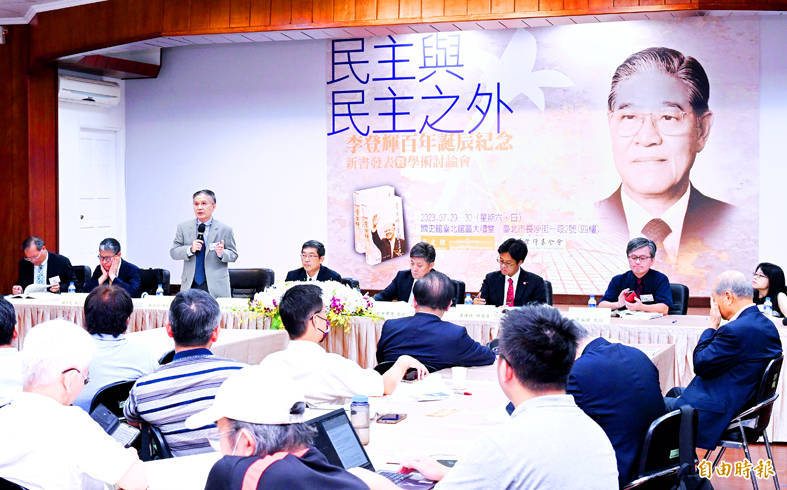《TAIPEI TIMES》 Lee Teng-hui not reliant on US arms: researcher

People attend an academic forum hosted by the Lee Teng-hui Foundation and Academia Historica in Taipei on Sunday. Photo: Fang Pin-chao, Taipei Times
SHIFT IN STRATEGY: Lin Hsiao-ting was speaking about how Taiwan diversified its sources of weaponry at the launch of a book commemorating the former president
By Hsieh Chun-ling and William Hetherington / Staff reporter, with staff writer
Former president Lee Teng-hui (李登輝) did not rely entirely on the US to procure arms, but instead divided the channels his administration used for arms purchases across several countries, a researcher said on Sunday.
For example, Lee secured German and French naval vessels, French Mirage 2000 fighter jets and US F-16 jets during his time in office, said Lin Hsiao-ting (林孝庭), a research fellow and curator of East Asia collections at the Hoover Institution Library and Archives.
Lin made the comments via videoconference at a launch event for a book commemorating the life of the late former president held by Academia Historica on Saturday and Sunday in Taipei. Sunday also marked the third anniversary of Lee’s death.
Yasuhiro Matsuda, a professor of international politics at the University of Tokyo’s Institute for Advanced Studies, also attended the event, along with 14 other researchers in the fields of politics, diplomacy and cross-strait relations, transitional justice, economics and social affairs.
Lin said that following the signing of the US-China joint communique on Aug. 17, 1982, Taiwan’s government and military became concerned that the US would gradually decrease its annual sale of arms to Taiwan, spurring Taiwan’s domestic arms industry.
At the same time, it sought to diversify its foreign sources of defense weaponry, he said, adding that Lee was very active on the issue.
Originally the US did not want to sell fighter jets to Taiwan, but later learned that Taiwan was in negotiations to buy jets from France, he said, adding that the Republicans then agreed to sell jets to Taiwan to bolster the campaign of former US president George H.W. Bush, who was running for the presidency at the time.
However, in a rare move, Lee rejected the US offer and proceeded with the procurement of Mirage fighters from France, Lin said.
Three things contributed to Taiwan’s breakthroughs in international arms procurements during Lee’s administration, he said.
First, the Cold War was coming to an end, which meant arms manufacturers were eager to find new markets, Lin said.
Second, after the Tiananmen Square Massacre in Beijing in 1989, China’s international image was badly damaged, putting it at a diplomatic disadvantage and making countries more willing to engage with Taiwan, he said.
Third, Taiwan’s economy and strength as a trading partner had grown since the 1980s, enabling Lee to promote a “pragmatic foreign policy,” Lin said.
Taiwan’s military posture under Lee had also changed from that of former Taiwanese presidents who had ambitions of “taking over mainland China,” to a defensive stance, he said.
Lee was president from 1988 to 2000. As vice president, Lee succeeded then-president Chiang Ching-kuo (蔣經國) after he died in January 1988.
Lee became Taiwan’s first directly elected president in 1996.
新聞來源:TAIPEI TIMES






















